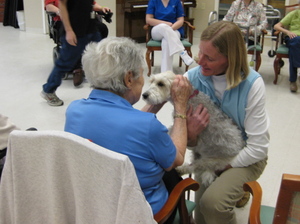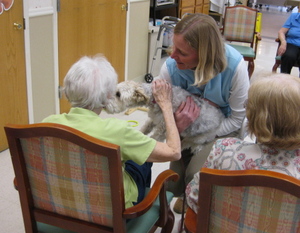After last week’s visit, I fully expected to receive a call from the facility telling me that my patient had died. But, having received no call, James (decked out in his therapy dog vest and ID) and I got in the car and headed to the interstate to drive down south to the Connecticut border where we make our weekly hospice visits.
Our patient appeared quite agitated when we arrived at her door. She was trying to communicate something to me – but was unable to speak. She tried to raise her right arm, her finger pointing to the door, as she again tried to speak. Unfortunately, I was unable to understand what she was trying to tell me. She was becoming frustrated and sad… I asked her if she wanted us to go – but she shook her head, No. More frustration ensued. I felt helpless, not knowing what to say or do.
Seeing plenty of space on the bed for James to lie down next to her, I directed him to get up and gently position himself alongside her. He couldn’t settle down – so unusual for James. He then started sniffing, and sniffing. Since her food tray was still in the room when we arrived, I assumed he was sniffing out spilled food – which I mentioned to our patient… but she kept shaking her head – then mouthing, No. Suddenly, it dawned on me that she might need to be changed… I asked her if this was the case. She nodded, Yes.
Realizing what was going on, I said, I’ll take James off your bed and ask an aid to come in to help. She again nodded, Yes, and then seemed to relax… When the aid came in, I said what I always say when we leave: James and I will see you next week. I don’t know how she was able to do it, but somehow she mustered the strength to reach out and take my hand – then, somehow found her voice to softly say, I’m sorry, I’ll be better next time.
When individuals enter a nursing home, they lose their independence and are stripped of their dignity as the passing days go by. A woman I have been visiting at another nursing home for 18 years, dreads Thursdays because it’s shower day when an aid wheels her into the shower room and gives her a shower. She is a very proud and modest person and finds this extremely embarrassing. It’s important to extend to these folks any possible opportunity to allow them a semblance of these elements that they have lost. I wish I had been able to read meaning into my patient’s initial frustration and avoided having her be embarrassed. The purpose of our visit is to bring comfort and alleviate sadness – not the opposite. This is tough… the journey taken with each of my hospice patients has been so different…








